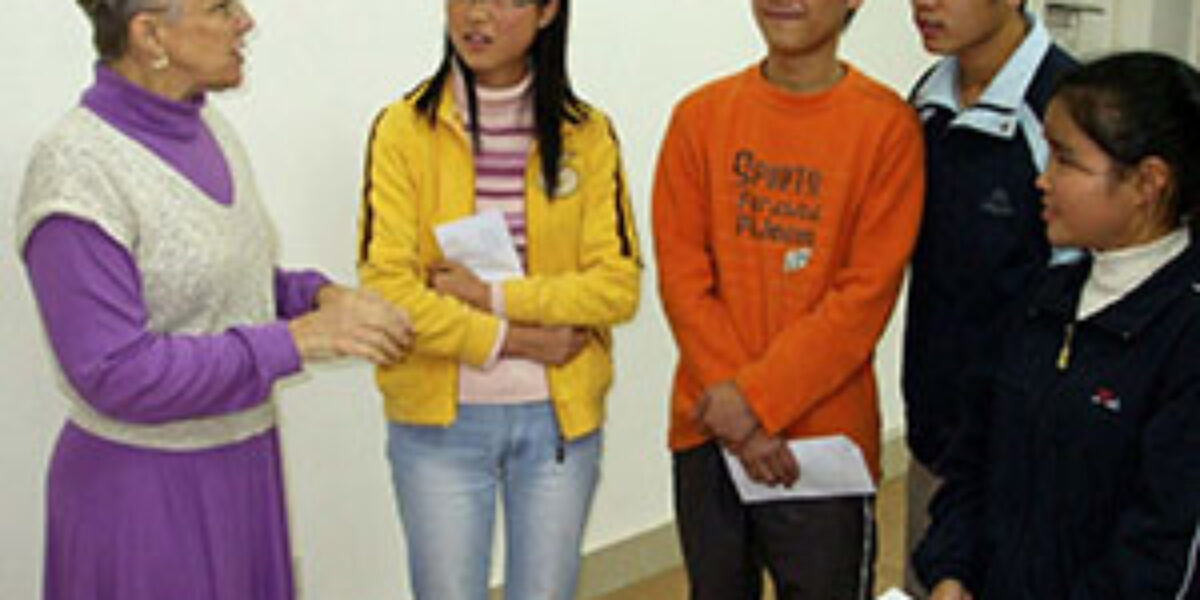CHONGQING, China (Mennonite Mission Network/Mennonite Church Canada Witness)— Twelve freshmen at Chongquing Medical University were able to attend school this fall because of “love fund” scholarships.
Julie and Philip Bender, joint workers with Mennonite Mission Network and Mennonite Church Canada Witness, and Mark Sunderman, a Mennonite Central Committee worker, helped develop these scholarships to assist poor students financially so they can focus on their studies.
In China, it is difficult to gain access to education beyond primary levels. Fees are high and opportunities for entrance are few. Two years ago, scholarships for students at Chongquing Medical University were created by Mennonite Partners in China with funding from MCC Global Families Program. MPC is a partnership of four Mennonite agencies; Mennonite Mission Network, MCC, Witness and Eastern Mennonite Missions.
Scholarship or “love fund” recipients were selected by the university’s Student Services office based on financial need and willingness to consider employment after graduation in rural communities. In many of those communities, medical care is difficult to gain access to and sometimes substandard.
Wang Fen Fen, a second year dentistry student and a 2006 scholarship recipient, reflected on her rural home. She said, “In Lian Yun Gang, the medical care is not very good. There have been accidents and deaths in the public hospital, which has angered the public. There are many complaints that the hospital care is too expensive and of poor quality.”
Most scholarship recipients are orphans or have only one parent, adding to their financial challenges.
Chen Long, a student from Yilong county in eastern Sichuan, said after his father died he managed to complete middle school with the support of neighbors and friends. When his younger brother also expressed a desire for continuing education, dreams of high school seemed even further out of reach for Chen.
As a 15-year-old, he traveled to a small city near the provincial capital of Chengdu. With high test scores in hand, he managed to convince the principal of a new private high school to accept him under full scholarship. Chen’s high achievement level helped the new institution develop the kind of reputation needed to attract more students.
University life still poses challenges for Chen, but, thanks to part time jobs and his scholarship, he has managed. Now in his second year of study and majoring in public health inspection, Chen is looking to the future. He hopes to improve health care and disease prevention techniques, preferably back home in Yilong county.
As an orphan, Fu Juan Juan, a second-year laboratory medicine student, spoke of the pressure her extended family endures to assist her with her university expenses. The scholarship she received last year eased some of that pressure. Like many other post-secondary students, Fu Juan Juan works part time tutoring middle school students in Chinese and Math.
Wang Fen Fen, who also tutors, echoed the importance of financial support.
“The scholarship has helped relieve the burden on my family. It has helped me feel more relaxed and able to learn and try my best to do my studies and part-time jobs,” she said.
Both Fu Juan Juan and Wang Fen Fen teach Chinese to Philip Bender.
Julie Bender has witnessed the impact financial struggle can have on students.
“I have heard my students talk about poor classmates who are forced to eat only one meal a day,” she says.
Bender’s role extends beyond language education. She sees her classroom as a space where students can explore their future as leaders in the medical field.
“I thoroughly enjoy teaching my 270 medical students, who are both bright and have fairly high English-speaking skills this fall semester,” she said. “It is possible to engage them in discussions of various issues and values. What an awesome privilege to teach these ‘future leaders’ in Chinese society! I like to remind them of this fact.”







